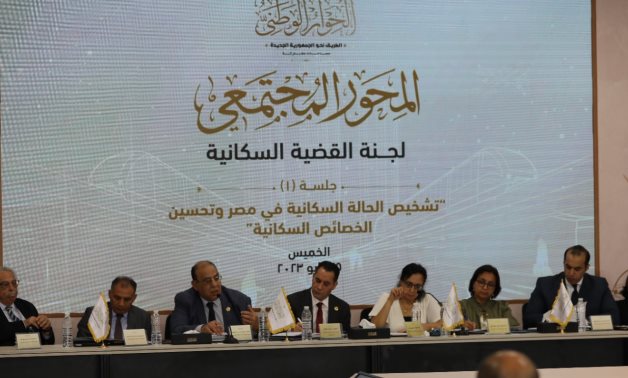
The Committee for Population Issues at the National Dialogue holds a session on the overpopulation problem in Egypt- press photo
CAIRO - 4 September 2024: The National Human Rights Strategy has emerged as a key focus in the ongoing National Dialogue. According to journalist and member of the National Dialogue's Board of Trustees, Gamal El-Keshky, the dialogue has prioritized human rights since its inception.
This focus is evident in the formation of a dedicated committee to address issues of rights and freedoms, alongside the reactivation of the Presidential Pardon Committee, which has worked on addressing pretrial detention cases.
El-Keshky emphasized that the National Dialogue has played a crucial role in advancing human rights in Egypt, particularly through recommendations that led to the release of over 2,000 detainees. These efforts have been in alignment with the National Human Rights Strategy, underscoring the political leadership's commitment to enhancing human rights as a cornerstone of the New Republic.
Among the National Dialogue's major achievements is President Abdel Fattah El-Sisi's response to amend the law on pretrial detention. El-Keshky noted that human rights extend beyond political cases to include economic and social issues, with the dialogue's discussions and recommendations covering vital areas such as family rights, identity, social justice, and more.
Alaa Abed, Chair of the Transport and Communications Committee in the House of Representatives and Deputy Speaker of the Arab Parliament, highlighted the importance of the National Dialogue in reinforcing human rights. He pointed out that the dialogue's recommendations on pretrial detention and other human rights issues reflect the state's seriousness in implementing reforms.
Abed also noted that the outcomes of the National Dialogue contribute directly to the implementation of the National Human Rights Strategy, enhancing political and social life in Egypt. He praised the ongoing presidential initiatives for releasing prisoners who have not been involved in violent or criminal activities, viewing them as a testament to the state's dedication to human rights.
Political science professor Tarek Fahmy remarked that the National Dialogue has significantly contributed to human rights by facilitating presidential pardons and addressing pretrial detention issues. Fahmy asserted that the dialogue has evolved into a vital platform for political reform under President El-Sisi's leadership, leading to positive changes in the political and rights landscape in Egypt.
Reda Farhat, Deputy Chairman of the Conference Party and political science expert, added that the National Dialogue has improved the political climate in Egypt by fostering exchange of views among various political forces. This collaborative approach has led to key recommendations on social justice, the political system, and human rights, including the notable release of many detainees who were not involved in violence or terrorism.
Farhat also highlighted the dialogue's focus on reducing unwarranted pretrial detention periods and improving detention conditions, aligning with international human rights standards. Moreover, the dialogue has addressed other critical human rights issues such as freedom of expression, women's rights, and the role of civil society, with significant initiatives aimed at empowering women and enhancing their participation in public life.
Farhat concluded that despite the challenges, the National Dialogue remains a testament to Egypt's commitment to human rights and serious engagement with pressing societal issues. He expressed optimism that the ongoing discussions will lead to legal reforms that strengthen the rule of law and protect human rights in Egypt, consistent with international standards, and help build a brighter, more just future for all Egyptians.
Comments
Leave a Comment